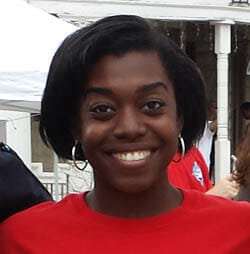She Uses Her Background as a Child With Parents in the Military to Serve Vets and Their Families
In honor of Veterans Day, this week we're telling the stories of people making a difference for veterans in their communities. Meet Charity Bowen, a member of the Veteran Leader Corps – an AmeriCorps program run by Points of Light.
 Charity Bowen
Charity BowenHaving grown up with both parents serving in the military, Charity Bowen knows firsthand the challenges veterans and military families can face. Moving from base to base as a child gave her deep insight into the community she serves today as a member of the Veteran Leader Corps.
“The fact that it’s fundamental to the corps program to help veterans’ families convinced me to sign up,” says Bowen, 25, of San Antonio, Texas. “It was important to me that the program focused on this neglected part of the population.”
The Veteran Leader Corps (VLC), an AmeriCorps program run by Points of Light, serves as a critical component of the Community Blueprint, a coalition of organizations designed to share tools and resources to better serve the veteran community at the local level.
The VLC program – which recruits AmeriCorps members to support the needs of veterans and military families – focuses specifically on providing employment support services and community engagement opportunities for veterans.
As a VLC member serving with the Military and Veteran Community Council – a group of organizations and agencies serving veterans in San Antonio, Bowen has recruited many volunteer leaders from within the veteran community to serve and support veterans focusing on health and caregiving.
Bowen reaches out to veterans and military families frequently to share with them the opportunities available and events she and her team have organized for them, such as job fairs.
“The first veteran I met at the beginning of the program at my first job fair really impacted me,” Bowen says. “He shared his five-year experience in the Navy with me, showed me his resume and mentioned how difficult it was to find a decent-paying permanent job. He was educated and had good qualifications.”
Through her service, Bowen has learned the key components of job fairs that are most helpful to veterans.
“Now every time while organizing a fair, I ask myself, what's the percentage of jobs versus educational resources?” Bowen says. “Are there any employers hiring? Are recruiters referring job seekers to other employers? Is there resume help? Are there mock interviews? Are recruiters explaining the application process?”
Bowen met veterans trying to get support through the Veterans Administration and find employment; they were frustrated because they either didn’t qualify for services or the process took too long.
She says whenever she or one of her colleagues offered alternative options available in the community, the veterans would often express surprise – and gratitude.
During her service, Bowen estimates that she has assisted more than 200 veterans in getting the help and resources they needed.
In serving veterans, Bowen herself has developed skills and knowledge in the areas of outreach, networking and community coordination, along with refreshing her volunteering spirit.
She says, “My faith in service deepens every time someone comes up and says, `I am glad someone is out there in the community engaging with us veterans, empathizing with what we are going through.’”